Deutsche Bahn
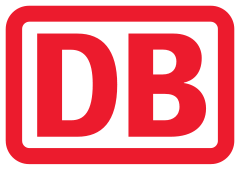 Deutsche Bahn's current logo since January 1, 1994 | |
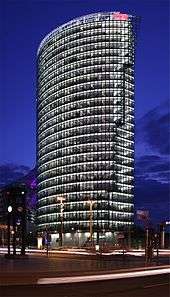 The corporate headquarters of Deutsche Bahn at Potsdamer Platz in Berlin. | |
| Aktiengesellschaft | |
| Industry | Railway transport, Logistics |
| Predecessor |
|
| Founded | 1 January 1994 |
| Headquarters | Berlin, Germany |
Area served | Europe |
Key people | Richard Lutz |
| Products | Rail transport, Cargo transport, Services |
| Revenue |
|
|
| |
|
| |
| Owner | Federal Republic of Germany (100%) |
Number of employees | 295,653 (2013) |
| Divisions | |
| Subsidiaries | |
| Website |
www |
Deutsche Bahn AG (IPA: [ˈdɔʏtʃə baːn]; abbreviated as DB, DB AG or DBAG) is a German railway company. Headquartered in Berlin, it is a private joint-stock company (AG), with the Federal Republic of Germany being its single shareholder.[2][3] Deutsche Bahn describes itself as the second-largest transport company in the world, after the German postal and logistics company Deutsche Post / DHL, and is the largest railway operator and infrastructure owner in Europe. Deutsche Bahn was the largest railway company in the world by revenue in 2015.[4] It carries about two billion passengers each year.
Deutsche Bahn (German for "German Railway") came into existence in 1994 as the successor to the former state railways of Germany, the Deutsche Bundesbahn ("German Federal Railway") of West Germany and the Deutsche Reichsbahn ("German Reich Railway") of East Germany.[5] It also gained ownership of former railway assets in West Berlin held by the Verwaltung des ehemaligen Reichsbahnvermögens (Administration of the Former Reichsbahn Assets).
History
While the railway network in Germany dates back to 1835 when the first tracks were laid on a 6 km (3.7 mi) route between Nuremberg and Fürth, Deutsche Bahn has been a relatively recent development in German railway history. On January 1, 1994, Deutsche Reichsbahn and Deutsche Bundesbahn were merged to form one company, and so, they became Deutsche Bahn. At the same time, during its creation, Deutsche Bahn adopted its current logo and took over Deutsche Bundesbahn's abbreviation and DB logo, as Kurt Weidemann are responsible to modernise the logo, while Erik Spiekermann is designing the new corporate font DB Type. When Deutsche Bahn was formed in January 1994, it became a joint stock-company, and were designed to operate the railways of both the former East and West Germany after unification in October 1990 as a single, uniform, and private company,[6] but there are three main periods of development in this unified German railway: its formation, its early years (1994–1999), and the period from 1999 to the present.
Originally, DBAG had its headquarters in Frankfurt am Main but moved to Potsdamer Platz in central Berlin in 1996, where it occupies a 26-storey office tower designed by Helmut Jahn at the eastern end of the Sony Center and named Bahntower. As the lease was to expire in 2010, DB had announced plans to relocate to Berlin Hauptbahnhof, and in 2007 a proposal for a new headquarters by 3XN Architects won an architectural competition which also included Foster + Partners, Dominique Perrault and Auer + Weber.[7] However, these plans have been put on hold, and the Bahntower leased for at least three more years.[8]
1999 to present
The second step of the Bahnreform (Railway reform) was carried out in 1999. All rolling stock, track, personnel, and real assets were divided between the holdial subsidiaries of DBAG: DB Reise & Touristik AG (long distance passenger service, later renamed DB Station & Service AG (operating the stations). This new organisational scheme was introduced not least to implement European Community directive 91/440/EEC that demands access to railway systems free of discrimination.
In December 2007, DB reorganised again, bringing all passenger services into its DB Bahn arm, logistics under DB Schenker and infrastructure and operations under DB Netze.
The DB is owned by the Federal Republic. By the Constitution, the Federal Republic is required to retain (directly or indirectly) a majority of the infrastructure (the present DB Netze) stocks.
In 2008, it was agreed to "float" a portion of the business, meaning an end to the 100% share the German Federal Republic had in it, with a plan that 25% of the overall share would be sold to the private sector.[9] However the onset of the financial crisis of 2007–08 saw this cancelled.[10]
In 2014, the Jewish community of Thessaloniki demanded that the Deutsche Bahn, which is the successor of the Deutsche Reichsbahn, should reimburse the heirs of Greek Holocaust victims of Thessaloniki for train fares that they were forced to pay for their deportation from Thessaloniki to Auschwitz and Treblinka between March and August 1943.[11][12]
In June 2018 controversy grew in the United Kingdom over widespread cancellations of railway services and a large number of delayed services operated by Deutsche Bahn in Britain, under its Northern brand. This resulted in Britain's Minister of Transport, Chris Grayling, setting up an enquiry into whether the Deutsche Bahn subsidiary had breached its contractual agreement to provide railway services in the north of England. He warned that if the company was found to be in breach of its contractual agreements it could be banned from running railway services in the United Kingdom.[13]
Logo history
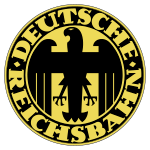 Deutsche Bahn's former logo as Deutsche Reichsbahn, used from April 1, 1920 to April 26, 1945.
Deutsche Bahn's former logo as Deutsche Reichsbahn, used from April 1, 1920 to April 26, 1945. Deutsche Bahn's previous logo as Deutsche Reichsbahn, used from April 27, 1945 to December 31, 1993.
Deutsche Bahn's previous logo as Deutsche Reichsbahn, used from April 27, 1945 to December 31, 1993.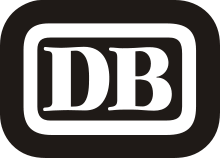 Deutsche Bahn's previous logo as Deutsche Bundesbahn, used from September 7, 1949 to December 31, 1993.
Deutsche Bahn's previous logo as Deutsche Bundesbahn, used from September 7, 1949 to December 31, 1993. Deutsche Bahn's current logo since January 1, 1994.
Deutsche Bahn's current logo since January 1, 1994.
Members of the board
Richard Lutz serves as CEO and CFO. He became the chief executive in March 2017 following the resignation of Rüdiger Grube in January that year.[14] Other members of the board include Berthold Huber and Ronald Pofalla.[15]
Corporate subdivisions
DB is organized as a business group and as of 2011 had over 1,000 affiliates, of which 287 were in Germany.[16]
The DB group (Deutsche Bahn AG) is divided into five main operations groups: Arriva, DB Bahn, DB Dienstleistungen, DB Netze, and DB Schenker. These subsidiaries are companies in their own right, although most of them are 100% owned by DBAG. [17]
Arriva
.jpg)
Deutsche Bahn placed a bid in May 2010 for the UK-based transport company Arriva. Arriva runs bus and rail companies in 12 European countries. The merger was approved by the European Commission in August 2010, subject to DB divesting Arriva services in Germany (these are now run as Netinera). The merger became effective on 27 August 2010.[18]
Services in the UK formerly run as DB Regio are now operated by a new subdivision of the company, Arriva UK Trains. It operates the Arriva Trains Wales, Chiltern Railways, CrossCountry and Grand Central operations. On 1 April 2016 Arriva became the operator of the Northern rail franchise. It also holds a 50% shareholding in London Overground Rail Operations and has lodged an application to operate services under the Great North Western Railway brand. In November 2016, Arriva Rail London commenced operating the London Overground concession in its own right. The former Tyne & Wear Metro operations, already started by DB Regio UK, ended in 2017.
DB Bahn
DB Bahn is the group that manages passenger travel within Germany. Originally called Reise & Touristik, this group is responsible for the managing, ticketing, servicing and running of German passenger services. The group also handles the information and customer service side of the operation.[19] This group is divided into two business areas: DB Fernverkehr and DB Regio.
DB Fernverkehr
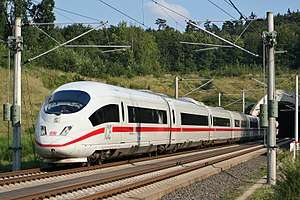
DB Fernverkehr AG is a semi-independent division of Deutsche Bahn that operates long-distance passenger trains in Germany. It was founded in 1999 in the second stage of the privatisation of German Federal Railways under the name of DB Reise & Touristik and renamed in 2003.
DB Fernverkehr operates all InterCityExpress and InterCity trains in Germany as well as several EuroCity trains throughout Europe. Unlike its sister companies DB Regio and DB Schenker, DB Fernverkehr still holds a de facto monopoly in its segment of the market as it operates hundreds of trains per day, while all competitors' long-distance services combined amount to no more than 10–15 trains per day. Additionally DB Fernverkehr operates a few long-distance coach services throughout Germany, called IC Bus.
DB Regio
.jpg)
DB Regio AG is the subsidiary of Deutsche Bahn that operates passenger trains on short and medium distances in Germany. Unlike its long-distance counterpart, DB Fernverkehr, it does not operate trains on its own account. Traffic is ordered and paid for by the Bundesländer (states) or their respective SPNV-Aufgabenträger (Regional train operation supervisors). Examples are the Landesnahverkehrsgesellschaft Niedersachsen (LNVG), responsible for train services in Lower Saxony (except in the Hanover region) or the three Aufgabenträger in North Rhine-Westphalia: Verkehrsverbund Rhein-Ruhr (VRR), Zweckverband Nahverkehr Rheinland (NVR) and Zweckverband Nahverkehr Weatfalen-Lippe (NWL), the former also acting as a customer-faced fare association. Competition for those state-sponsored services is somewhat more fierce than for long-distance services. Some states have awarded long-term contracts to DB Regio (usually 10 to 15 years), in others, DB Regio’s operations are decreasing, in North Rhine-Westphalia, their market share is expected to be lower than 50 %. DB Regio rail services are divided into several regional companies:
- DB Regio Nord for Schleswig-Holstein, Hamburg, Lower Saxony, Bremen
- DB Regio Nordost for Berlin, Brandenburg, Mecklenburg-Vorpommern
- DB Regio NRW for North Rhine-Westphalia
- DB Regio Südost for Saxony, Saxony-Anhalt, Thuringia
- DB Regio Hessen for Hesse
- DB Regio Südwest for Rhineland-Palatinate, Saarland, parts of Baden-Württemberg and Hesse
- DB Regio Baden-Württemberg for the rest of Baden-Württemberg
- DB Regio Bayern for Bavaria
- S-Bahn Hamburg
- S-Bahn Berlin
- RegioNetz (small, independent networks, like Erzgebirgsbahn, Gäubodenbahn, Kurhessenbahn, Oberweißbacher Bergbahn, Südostbayernbahn, Westfrankenbahn for easier organisation)
The bus services consist of 25 bus companies, which have subsidiary companies themselves.
DB Stadtverkehr
DB Stadtverkehr was responsible for commuter services of the Berlin and Hamburg S-Bahn networks and numerous bus companies. The subsidiary was integrated into DB Regio on 31 December 2010. The two S-Bahn networks handled and still handle over 500 million passengers annually.[20]
DB Netze
Since the end of 2007 DB Netze has been responsible for infrastructure and operations, taking over from DB Netz AG. Its business areas including DB Netze Fahrweg, DB Netze Energie, DB Netze Personenbahnhöfe, DB ProjektBau and DB Station&Service. A further business area known as DB Dienstleistungen covers six different areas of operations: DB Fahrzeuginstandhaltung, DB Systel, DB Services, DB Fuhrpark, DB Kommunikationstechnik, and DB Sicherheit.
DB Schenker
DB Schenker is the logistics arm of DB, as of 2008 it employed over 88,000 people, and was the largest European rail freight company.[21]
Its two business areas are DB Schenker Rail (formerly Railion)[19] and DB Schenker Logistics. Other subsidiaries include Bax Global, Transfesa, and the former English Welsh & Scottish, now DB Cargo UK. DB Schenker Rail has its head office in Mainz, and is the holding company for the five (at 1 January 2009) national subsidiaries: Railion Deutschland, Railion Nederland, Railion Danmark, Railion Italy, and Railion Schweiz.
DB Engineering & Consulting
Via its subsidiary DB Engineering&Consulting, DB signed a memorandum of understanding with Iranian rail operator Bonyad Eastern Railways (BonRail) in May 2017 and shortly after a consulting contract with Islamic Republic of Iran Railways; both projects were abandoned after the United States imposed new sanctions against Iran and said firms doing business with Iran would be barred from doing business with the United States.[22]
The California High-Speed Rail Authority's (CHSRA) board approved on November 15, 2017 an early train operator contract with DB Engineering & Consulting USA.[23] The firm is the U.S. arm of Deutsche Bahn AG. As early train operator, DB Engineering & Consulting will assist CHSRA with planning, designing and implementing the state's high-speed rail program.
Foreign firms
DB also has interests abroad, owning the United Kingdom's largest rail freight operator, DB Cargo UK, which also operates the British Royal Train[24] and also has interests in Eastern Europe. It is possible to obtain train times for any journey in Europe from Deutsche Bahn's website.[25]
Trans-Eurasia Logistics is a joint venture with Russian Railways (RŽD) that operates container freight trains between Germany and China via Russia.
Train categories
Trains in Germany are classified by their stopping pattern:[26]
- Fernverkehr (long distance trains), also Fernzug
- ECE (Eurocity-Express) for international high-speed rail services. Currently only one route from Frankfurt to Milan while other international high-speed services are called ICE International
- ICE (Intercity-Express) for high-speed rail services between major cities and regions
- IC (InterCity) for long-distance trains connecting regions with each other. If the trains cross international boundaries, they are usually called EuroCity (EC). Some EuroCity services are operated by foreign state railways.
- Nahverkehr (local trains)
- IRE (Interregio-Express) serves regions and connects cities. IRE trains only exist in Baden-Württemberg and on the Hamburg–Berlin route
- RE (Regional-Express) serves regions and connects cities
- RB (Regionalbahn) stops at all stations (except where S-Bahn is also available) and is the most basic train service
- S (S-Bahn) is rapid transit and most services stop at all stations. S-Bahn operate high frequency services and are comparable with, for example, the London Overground
Train categories no longer used include:
- MET (Metropolitan) was a luxury train service between Hamburg and Cologne. The two special MET train sets now used for IC and ICE services, still have a comfort level above the regular IC and ICE coaches
- IR (InterRegio), set between RE and IC was meant to connect cities and regions at a lower price, but also be used for local traffic. Replaced partly by IC, RE and IRE
- SE (Stadt-Express) operated as a mixture of RE and RB: trains skipped many stations in urban areas but made all stops in the countryside. Rebranded as RE and RB. In some regions, such as Rhine-Main (Frankfurt, Rhein-Main-Verkehrsverbund), the local transit authority advertised trains as SE. Internally, DB classified them as either RE or RB, but even DB trains display "SE" on their destination boards. This ceased in December 2016.
In the early days of DBAG, the most basic train categories, which were in use since the early days of rail travel in Germany, were also used:
- D (D-Zug or Schnellzug, abbreviated from Durchgangszug) was the express train category and used to be the highest train category. It was replaced by IC and the even faster ICE. The trains of the SyltShuttle plus car shuttle service connecting the island of Sylt with the mainland are still officially referred to as D trains
- E (Eilzug) was the semi-fast service offering faster journeys than normal passenger trains but not at such long distances and speed as D trains, though there were some quite long running E trains. No direct successor, would be located between RE and IC
- N (Nahverkehrszug), the most basic form of train service stopping at all stations. When all local train services were vertaktet, i.e. operating at an fixed interval (mostly one train per hour), they were rebranded as RB
There are several other operators in Germany which sometimes offer other categories, also, a local transport authority or tariff associations might brand the trains in a different way than DB does. For example, in the Nuremberg region, RE and RB trains are not differentiated, but called R instead. In some regions, such as Verkehrsverbund Berlin-Brandenburg, private operators do use the RE and RB labels, in others, such as Saxony, they do not. In online and print information systems of DB, private trains officially labelled RB and RE by their operators, might get a different label, for example "ABR" for trains operated by Abellio, though on platforms, trains and maps or timetables issued by the local transport authority overseeing regional train services, these abbreviations usually do not appear.
Codeshare agreements
In conjunction with Emirates, China Airlines, TAM Airlines, Biman Bangladesh Airlines, and Lufthansa, Deutsche Bahn operates the AiRail Service between Frankfurt Airport and Cologne/Bonn, Düsseldorf, Freiburg, Hamburg, Hanover, Mannheim, Munich, Nuremberg, and Stuttgart. Deutsche Bahn has the IATA designator 2A.[19]
Tickets
DB offers two different pricing models:
- The Flexpreis (originally Normalpreis): gives full flexbility, i.e. all trains on the given date can be used on the chosen route
- The Sparpreis is the cheaper, advanced fare. Prices for long-distance journeys start as low as €19.90, but Sparpreis tickets are only valid on ICE, IC or EC trains noted on the ticket.
Local trains (S, RB, RE, IRE) also accept tickets issued by local transport associations, which can also be used on buses, trams, and U-Bahn trains.
DB offers concessionary fares with the BahnCard, which is available as BahnCard 25 (25% discount on Flexpreis and Sparpreis), BahnCard 50 (50% discount on Flexpreis and 25% discount on Sparpreis), and BahnCard 100 (unlimited travel on all Deutsche Bahn trains, most private train companies and also in many local transport associations).
Other special tickets, such as Interrail or the Schönes-Wochenende-Ticket, giving unlimited journeys on local trains and in many transport associations, are also available.
See also
References
- 1 2 3 Deutsche Bahn AG. "Annual Report 2016". Archived from the original on 2017-12-27. Retrieved 2017-12-27.
- ↑ "Members to the Supervisory Board of Deutsche Bahn AG". Archived from the original on 2012-10-25.
- ↑ "Deutsche Bahn AG at a glance". Deutsche Bahn. Archived from the original on 26 April 2009.
- ↑ http://www.railway-technology.com/features/featureengines-of-trade-the-ten-biggest-rail-companies-by-revenue-4943955/featureengines-of-trade-the-ten-biggest-rail-companies-by-revenue-4943955-1.html
- ↑ Lutz, Friedrich; Lange, Bernd; Müller, Matthias (2003). "DB launches new locomotive strategy". International Railway Journal. 43 (11): 42. – via Gale (subscription required)
- ↑ "The foundation of Deutsche Bahn AG" company website
- ↑ "Competition win for 3XN". World Architecture News. 21 December 2007. Retrieved 30 October 2009.
- ↑ http://www.ftd.de/unternehmen/handel_dienstleister/:Deutsche%20Bahn%20Pl%E4ne%20Umzug/346601.html%5Bpermanent+dead+link%5D
- ↑ "Partial sale of DB agreed" Railway Gazette International May 2008 page 289
- ↑ "DB flotation on hold" Railway Gazette International November 2008 page 843
- ↑ One way tickets Thessaloniki – Auschwitz Archived 2017-02-08 at the Wayback Machine., June 2015
- ↑ Zug der Erinnerung/Thessaloniki Zug der Erinnerung (non-government organisation “Train of Commemoration”).
- ↑ Gwyn Topham, Helen Pidd and Pippa Crerar, 'Northern and GTR could be barred from rail franchises' in The Guardian (UK newspaper), 4 June 2018
- ↑ Sapién, Josephine Cordero (22 March 2017). "Richard Lutz to be New CEO of Deutsche Bahn". Railway News. Retrieved 25 June 2018.
- ↑ "The Board of Management of Deutsche Bahn AG". Deutsche Bahn. Retrieved 2017-02-01.
- ↑ "Deutsche Bahn räumt bei Tochtergesellschaften auf" [German Rail to clean up its subsidiaries]. www.eurailpress.de. 21 July 2011. Archived from the original on November 13, 2011.
- ↑ "Business Units". Deutsche Bahn. Retrieved 2017-05-10.
- ↑ "EC approves DB's takeover of Arriva". Railway Gazette International. London. 11 August 2010. Retrieved 2010-08-19.
- 1 2 3 Deutsche Bahn AG. "DB Mobility Logistics Facts and figures 2012" (PDF). Archived from the original (PDF) on 2013-06-16. Retrieved 2013-07-07.
- ↑ Deutsche Bahn AG: Kennzahlen 2005 – DB AG mit bestem Geschäftsjahr ihrer Geschichte, 23 September 2006
- ↑ "Transportation and logistics in the DB Schenker group - Profile". DB Schenker. Archived from the original on 28 August 2008.
- ↑ Gernot Heller and Douglas Busvine (August 16, 2018), German rail operator, Deutsche Telekom end Iran projects Reuters.
- ↑ http://www.progressiverailroading.com/high_speed_rail/news/California-high-speed-rail-agency-selects-German-firm-as-early-train-operator--53285
- ↑ Macalister, Terry (28 June 2007). "Deutsche Bahn to run Queen's train". The Guardian.
- ↑ Tickets - Timetable Archived 2006-04-07 at the Wayback Machine.
- ↑ "Produktübersicht" on DB AG website
External links
![]()